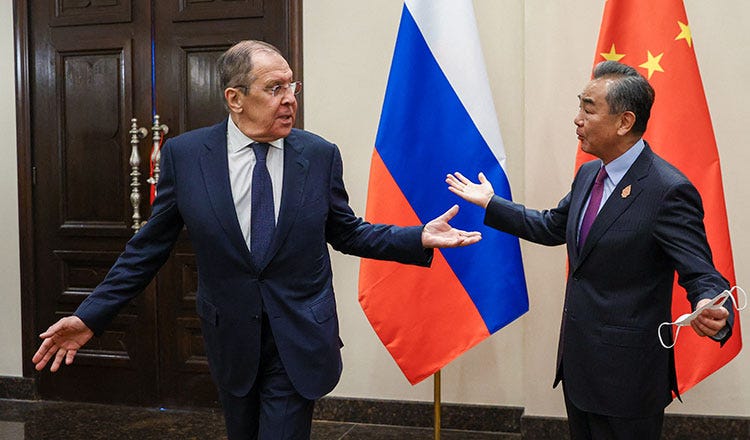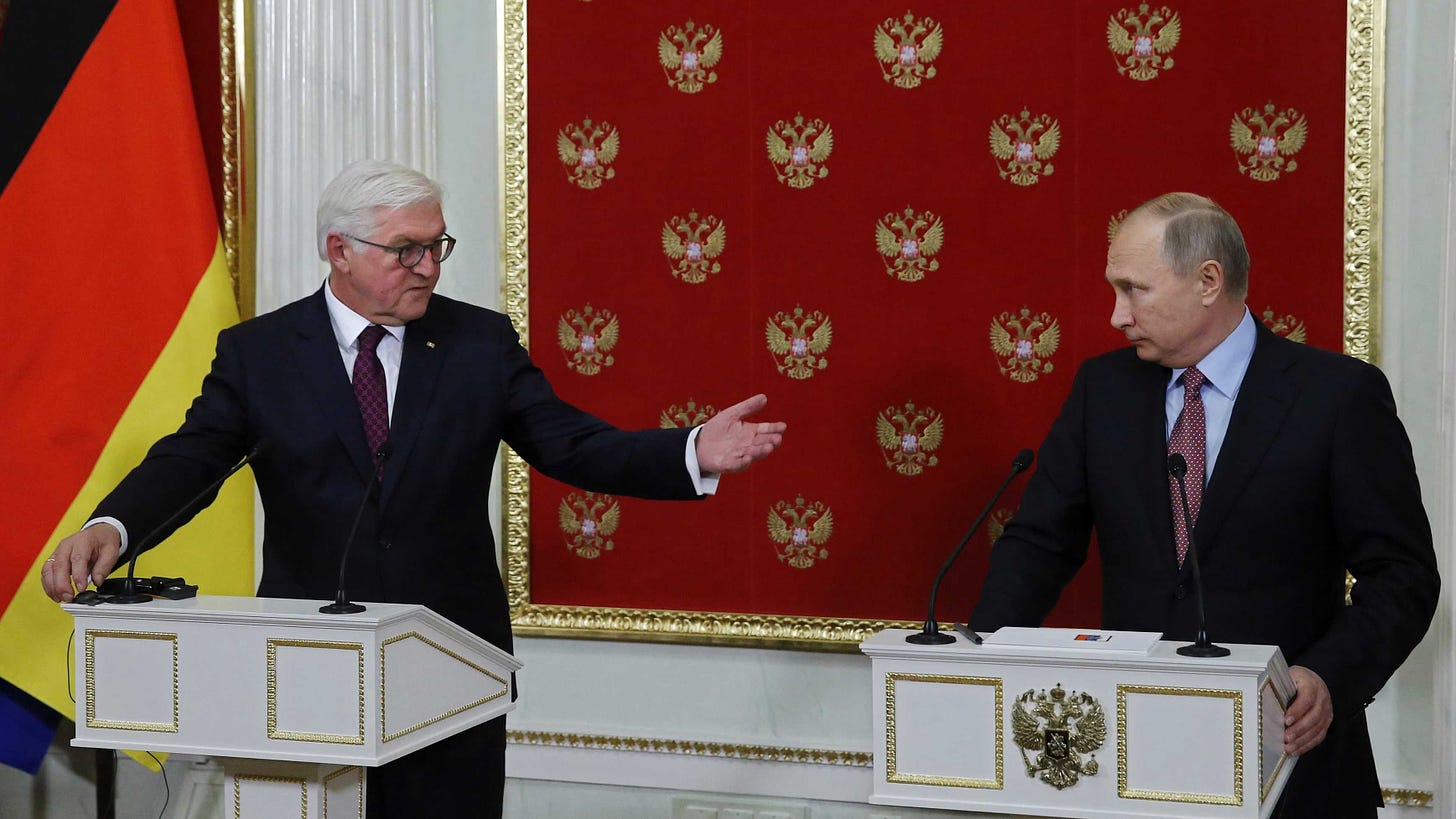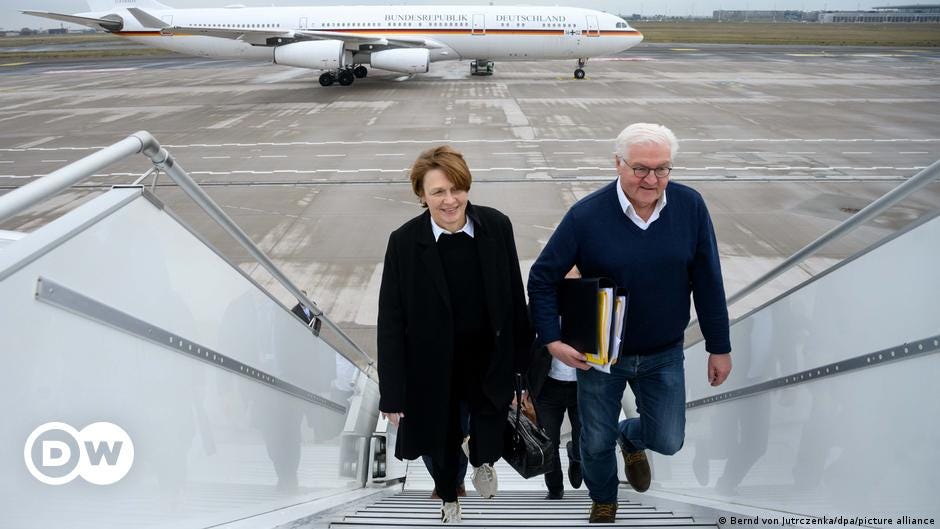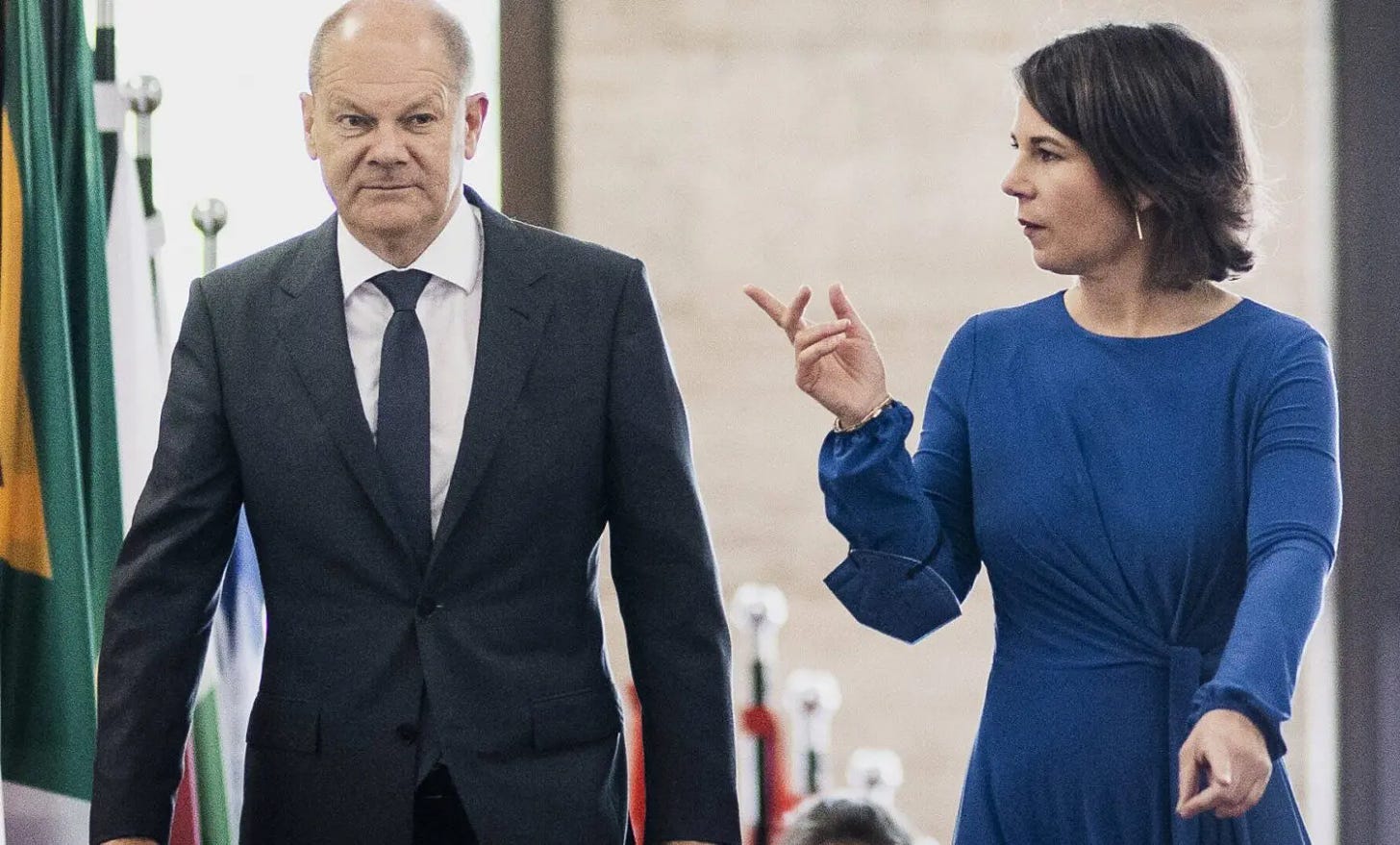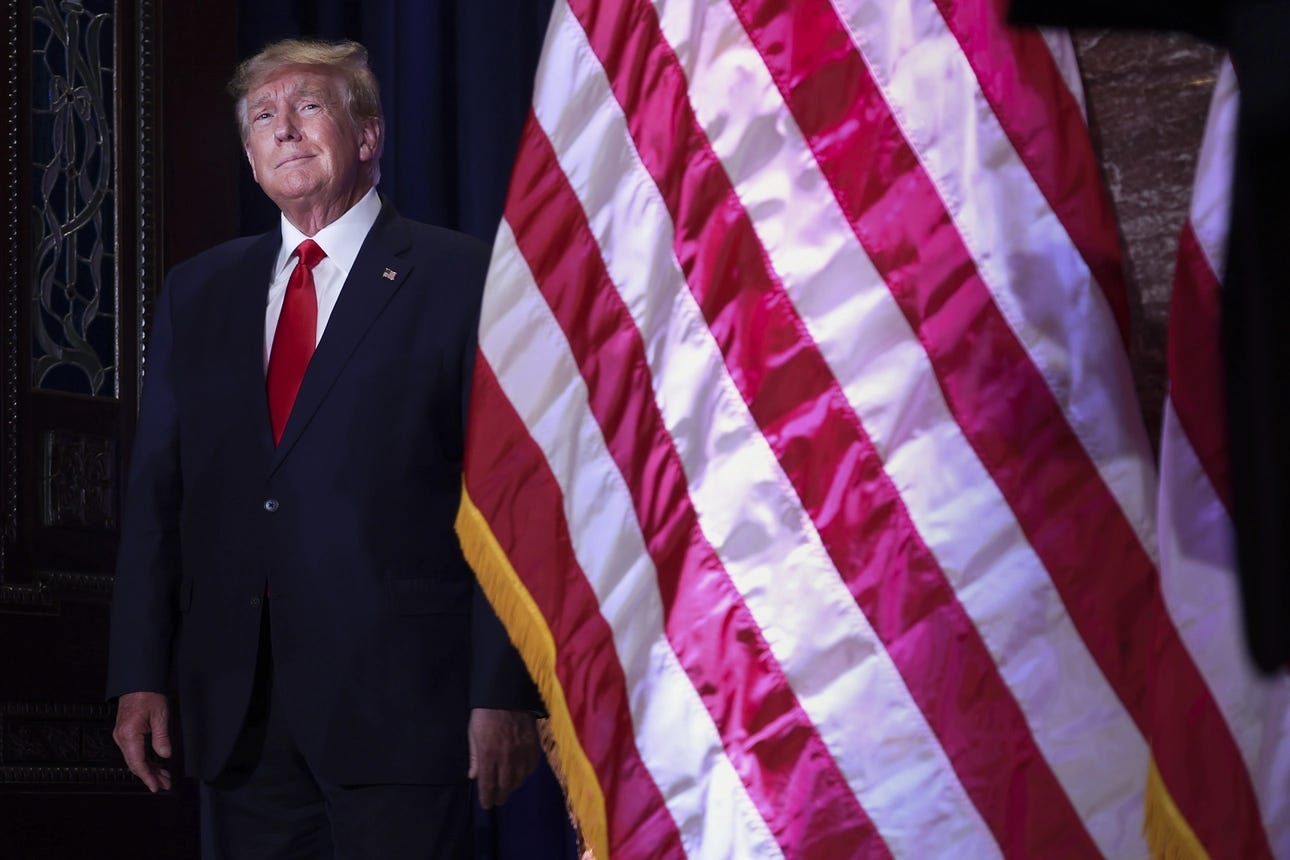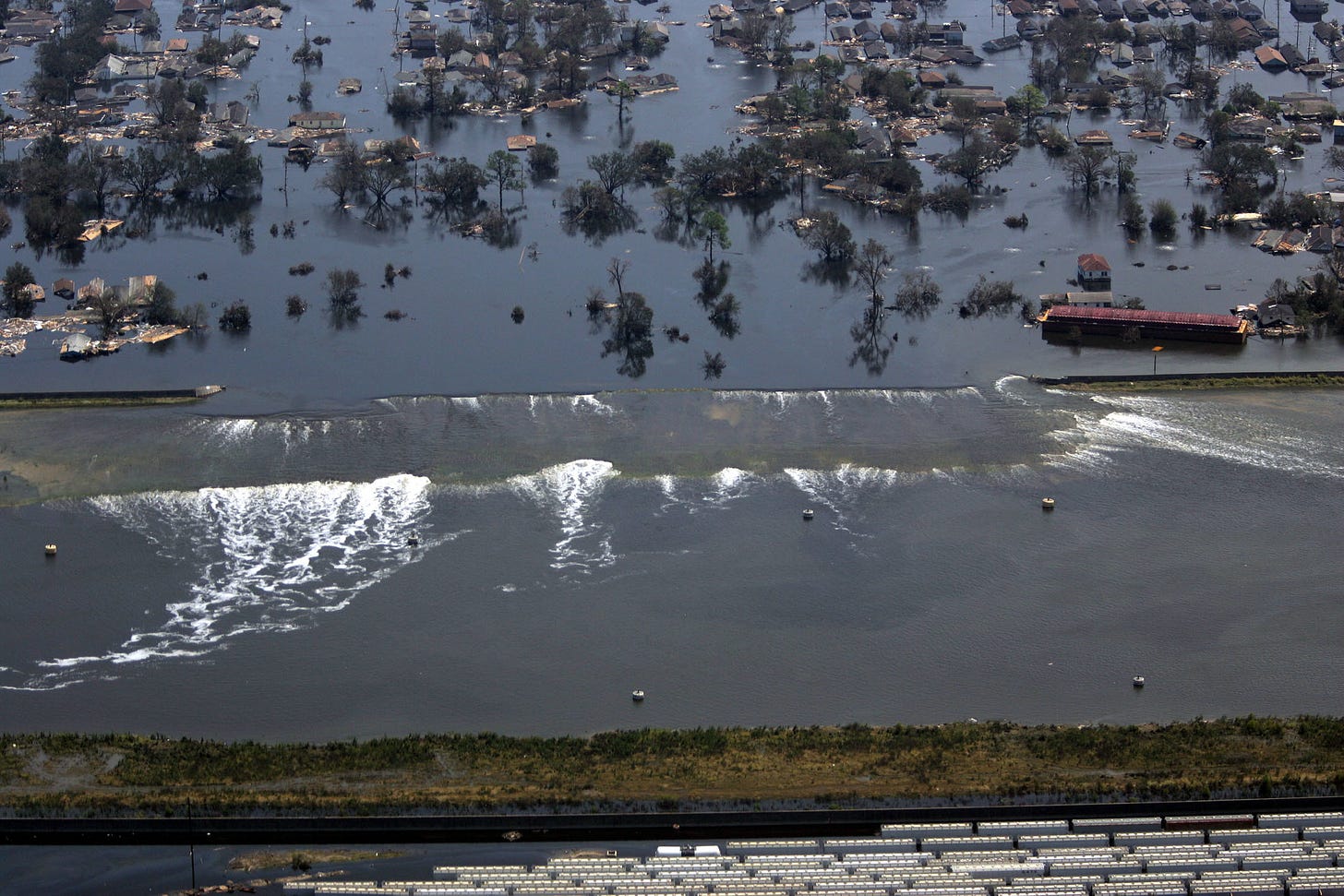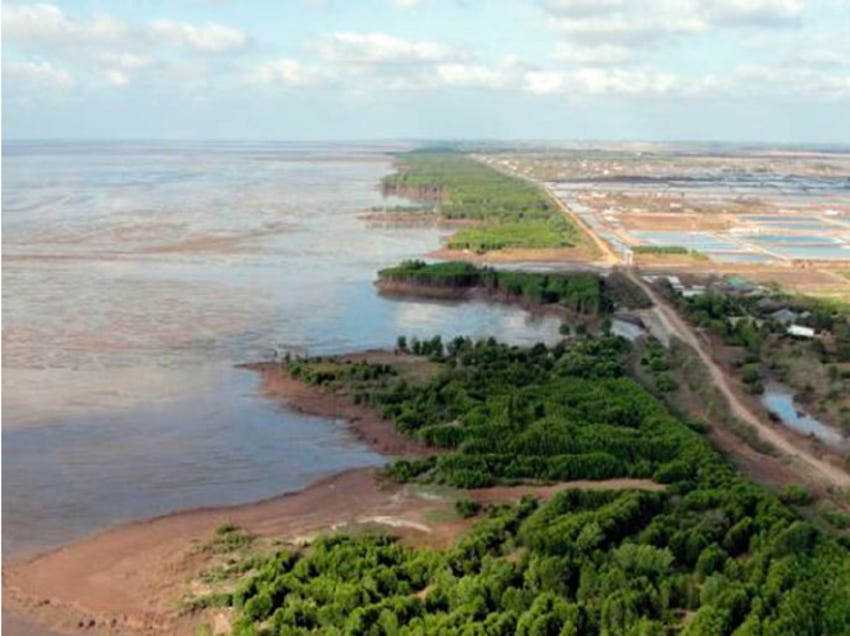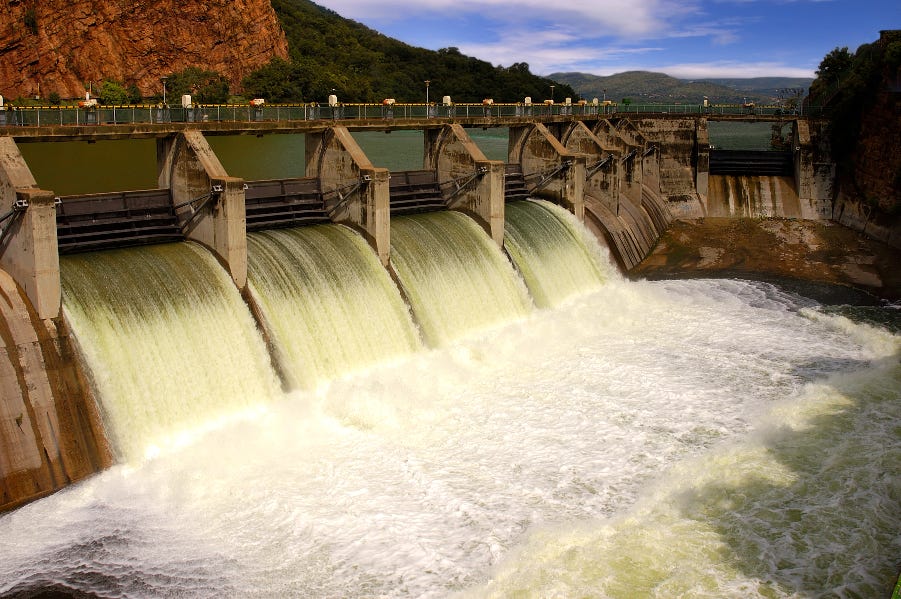Hot Water
Wang Yi in Munich, Blinken seeks meeting, steep ASEAN climb for Steinmeier, trafficlight coalition sees red, Trump seeks peace, security council at sea, Mekong delta rising tide, hydropower futures
UPDATE: The Long Mekong Daily takes the global temperature on hot topics and discovers Germany has security, trade and water on the table.
Security issues are tabled in Munich and Wang Yi might meet Blinken, but the US secretary of state is on the warpath.
German president Walter Steinmeier is facing a steep climb to extract security support from ASEAN nations, especially Cambodia, and is lining up for trade concessions that Europe and Germany so desperately need after the Ukraine debacle and NATO nonsense.
Germany’s “trafficlight” coalition was always fragile and allowed the Greens to push it into supporting the NATO proxy war, but tensions are rising.
Trump is running in 2024 on a platform of peace. The neo-cons, however, run the Whitehouse whoever is in power and the military-industrial complex and energy-pharma complex fund the neo-cons.
Germany has also tabled a UN security council paper on rising sea levels and small state anxieties. This plays to the Pacific islands, and Indian Ocean islands, with the Pacific islands forum about to proceed and the US desperate to renew the Treaties of Free Association that guarantee the US access to millions of square kilometres of the Pacific for its navy and military assets. The islanders need an independent economy, not more dependency on former colonial masters, of which Germany was one.
The Mekong Delta in Vietnam is also suffering from rising sea levels and new research shows that delta salinity levels could threaten the entire delta system, its flora and fauna and human productivity.
Finally, hydropower is getting another boost in importance, but water resources are in developing countries and some external powers keep politicising every step they take.
Is the planet in hot water, or is the real question how long will the global transition from G7 to Global South led order really take? Read on !
Wang Yi in Munich to communicate common, comprehensive, cooperative and sustainable security
Wang Yi will also attend the 59th Munich Security Conference and deliver a speech at its China session to communicate the vision of common, comprehensive, cooperative and sustainable security advocated by President Xi Jinping, make clear China’s abiding commitment to peaceful development and share China’s position on major international issues in light of the theme of the Conference.
Antony Blinken seeks meeting in Munich
US Secretary of State Antony Blinken is said to be considering a meeting with Wang Yi, China’s top diplomat, at a security conference later this week. It would be their first face-to-face talks since the US created a media campaign from a big balloon. Blinken and Wang would meet at the Munich Security Conference, which runs Feb. 17 to Feb. 19, provided China agrees.
59th Munich Security Conference February 17 to 19, 2023
The 59th Munich Security Conference (MSC) will take place from February 17 to 19, 2023. The MSC 2023 offers a platform for high-level debates on key foreign and security policy challenges.
Almost one year after Russia's invasion of Ukraine, the MSC 2023 will also provide an opportunity to take stock of alliance cohesion and political commitment to the so-called rules-based international order.
Looking beyond its transatlantic core, the MSC 2023 will place a particular emphasis on diverse perspectives from the Global South.
The MSC 2023 will also provide the German Federal Government with the first opportunity to present and discuss its new National Security Strategy.
Read more here, here and here.
German president Frank-Walter Steinmeier on three-day official visit to Cambodia
As part of his Indo-Pacific tour to enhance political and economic ties and cooperation with the region, Steinmeier will also be accompanied by a business delegation during his February 13-15 visit to the Kingdom. Steinmeier is holding discussions with Cambodian political leaders and representatives from civil society organisations and visit the site of demining operations that have received German support, see the ongoing repair and conservation work at Angkor Wat, and visit a memorial dedicated to the victims of the Khmer Rouge genocide.
Vann Bunna, a geopolitical researcher, said this latest visit by a world leader shows the Kingdom’s growing political and diplomatic influence, which could attract further attention from global and regional powers. He said that although Cambodia is a small country, it recently raised its influence and profile on the international stage as the rotating chair of ASEAN for 2022 and now appears to be a more credible partner for diplomatic, economic and security initiatives in the region.
"The German president's visit to Cambodia is a demonstration of the effectiveness of Cambodia's diplomatic diversification, meaning that the Kingdom is trying to make more friends and improve existing relations with many countries. Diplomatic diversification helps Cambodia to have more channels for economic, political and security development and it would benefit the Kingdom greatly if Germany were to reduce EU pressures and sanctions on Cambodia.
"Germany could easily become Cambodia's largest market in Europe under the right conditions"
Cambodia is important for Germany in the framework of the Indo-Pacific region itself, and the Kingdom is increasingly viewed as far more pragmatic than ideological or more similar in outlook to Singapore than China, for example – so it could help Germany by giving its priorities a voice in ASEAN.
Read more here.
Steep climb for German President seeking ASEAN trade and security partnership
The upcoming visit of German Federal President Frank Walter Steinmeier to Cambodia and Malaysia comes at a critical turning point for Europe - ASEAN relations and an opportunity for increased engagement as Germany considers relaxing its reliance on Chinese markets. German Federal President Frank Walter Steinmeier’s visit to Cambodia and Malaysia this week could not be more timely.
Germany’s Ampel (or ‘Trafficlight’) coalition government, which has recently experienced ballooning tensions between Foreign Minister Annalena Baerbock and Chancellor Olaf Scholz, is a key pillar of NATO support for its Ukraine proxy fighting Russia. Things are not going well for Ukraine and international pressure is growing to guide the US away from its neo-con directed campaigns to weaken both Russia and China, which have only weakened the G7 economies.
Thus, Germany needs Southeast Asia to offset its weakening industrial power and recessionary prone economy. Germany’s forced move away from Russian energy stability has created a windfall for US energy companies and the Biden administartion’s re-industrialisation subsides are further harming EU efforts to rebuild their economies. An ASEAN partnership is a way to shore up EU strategic autonomy, multilateralism, and fight against climate changes – ideas at the heart of German foreign policy.
The Editor
Trafficlight coalition meet red-light divisions
Olaf Scholz, the German chancellor, and his foreign minister are barely on speaking terms after she “went behind his back” to urge allies to bounce him into supplying tanks to Ukraine, according to reports. Annalena Baerbock twice made discreet efforts to get allies including the UK to push Mr Scholz into a decision on the Leopard tanks, the German weekly Die Zeit reported.
Ms Baerbock, 42, a hawk on weapons supplies to Ukraine, was “driven mad” by the indecision of her boss, the newspaper claimed. In the summer, she told Antony Blinken, the US Secretary of State, that the West needed to supply battle tanks, something Washington understood as a signal to increase the pressure on Mr Scholz.
Days later, Amy Gutmann, the US ambassador, told a German TV channel that Berlin should “take on more leadership” on the issue. Ms Baerbock also used a visit to London in January to appeal to James Cleverly, the Foreign Secretary, for the UK to deliver Challenger tanks, with the goal of isolating Mr Scholz on the international stage, according to Die Zeit.
Ministers were aware that Ms Baerbock was more keen on sending tanks than the chancellor, The Telegraph understands. Her discreet diplomacy, allied with public comments that undermined the official German position, enraged the chancellor and the two have barely been on speaking terms for months, the German report said.
Read more here.
Trump’s ‘24 game plan: Be the dove among the hawks
With two of his former top foreign policy aides potentially jumping into the race, Trump’s team is making early moves to define the debate. “I do think national security is going to be a much more important issue in 2024 than in many of the most recent presidential elections,” said Trump’s former national security adviser-turned-public critic John Bolton, who also is considering a 2024 run. “You may have noticed there’s a Chinese balloon floating over the country today.”
Aware that his instincts aren’t as hawkish as some of his potential Republican challengers, Trump and his aides have started to draw contrasts and set the parameters of the debate. On Thursday, Trump said Pompeo “took a little bit more credit than he should” for accomplishments made while he was secretary of State, a sign that Trump may try to minimize his opponents’ foreign policy experience, despite having been appointed by him. Later that day, the super PAC supporting Trump highlighted recent attacks on Haley by right-wing conservative commentators, some of whom called her a “warmonger” and “Neocon Nikki.”
Trump’s team was also eager to tout a Wall Street Journal op-ed endorsement this week from Sen. J.D. Vance, the populist Republican from Ohio, who touted Trump’s inclination against getting into foreign entanglements.
“Every Republican running is going to be opposed to [critical race theory]. Every Republican running is going to say we need to secure the border and we need to oppose amnesty. Every Republican running is for lower taxes and less regulation,” a Vance adviser said of Trump’s early foreign policy play. “It makes sense for Trump to drag the race where his opponents don’t want to be.”
Trump’s team also sees foreign policy as an area to draw distinctions with his potential top political foe, DeSantis, who gained national attention for his handling of the Covid-19 pandemic and embrace of cultural wars but who, as governor, has a limited track record internationally.
“The governors will have a tough time proving their foreign policy chops because it’s not in their job description so they’re going to have to do something to step up and prove to voters that they’re capable of handling all these issues that present themselves on the global stage,” said David Urban, a Republican strategist who remains close to numerous potential 2024 contenders.
“[Potential] candidates such as Pompeo and Haley and Pence and the [former] president can say, ‘Here’s me sitting down with Kim Jong Un, and here’s what we were able to accomplish with the Abraham Accords or on USMCA.’ Everyone has something they can talk about on concrete terms, where governors can’t and that will be a point of differentiation among a wide group of them.”
Read the full article here.
Open Debate on Sea-Level Rise and its Implications for International Peace and Security
Concerns about sea-level rise have been reflected in the Security Council’s work over the years. On 20 July 2011, the Council adopted its only formal outcome on climate change, peace and security, a presidential statement drafted by Germany. It said that the negative effects of climate change could in the long run exacerbate some existing threats to international peace and security. Among its other elements, the presidential statement expressed concern that “possible security implications of loss of territory of some States caused by sea-level-rise may arise, in particular in small low-lying island States”.
In July 2015, the Security Council held an open debate on “Peace and Security Challenges Facing Small Island Developing States”, convened by New Zealand. The threat of rising sea levels to the development and existence of small island developing states (SIDS)—as well as the potential that rising seas could lead to displacement and tensions over dwindling land and freshwater resources—were among the themes discussed at the meeting. Then-UN Secretary-General Ban Ki-moon, who briefed the Council, asserted that “rising sea levels, dying coral reefs and the increasing frequency and severity of natural disasters exacerbate the conditions leading to community displacement and migration. They threaten to increase tensions over resources and affect domestic and regional stability”.
Read more here.
Water-level changes and subsidence rates along the East Sea coastline of the Saigon-Dong Nai River Estuary and the Mekong Delta
Southeast Asian deltas are highly threatened areas for flooding as a response to the combined effects of natural compaction and subsidence exacerbated by human impacts, e.g. oil, gas and water extraction, retention of sediment discharge due to river damming and sand mining, land use changes, sea-level rise and storm-induced water-level setup.
Tide-induced water-level fluctuations on different time- and spatial scales, seasonal variations of freshwater runoff and sea-level setup can amplify the impact of sea-level rise and of storm surges on the coastal environment and its inhabitants. Moreover, increasing populations accompanied by growing societal demands can lead to further pressure on delta areas. For the Vietnamese Mekong Delta (VMD) and the Saigon-Dong Nai River (SGDNR), rates of subsidence of several cm/yr have already been determined, but for the coastal area, which is most vulnerable to sea-level rise and storm surges, a lack of detailed spatial and temporal information of this parameter exists.
Read the research here.
New IRENA report highlights evolving role of hydropower
The majority of hydropower assets, built several decades ago, need to be upgraded according to the report.Abu Dhabi, United Arab Emirates, 13 February 2023 - Current trends in the power sector have prompted changes in the role of hydropower, creating a need to adjust the way these assets are designed, operated and maintained, according to a new report by the International Renewable Energy Agency (IRENA). The The Changing Role of Hydropower: Challenges and Opportunities, produced in the context of IRENA’s Collaborative Framework on Hydropower, provides a snapshot of the current status of hydropower and lays out a vision of how to realise its potential.
“Hydropower has been an effective source of clean power generation for more than a century,” said IRENA Director-General Francesco La Camera. “However, with the rapidly evolving energy landscape, it is important to reevaluate its future role and leverage recent technological advancements that can maximise its potential while ensuring its sustainability and climate resilience.”
According to IRENA’s 1.5°C Scenario, if the world is to completely decarbonise and meet the climate goals set in the Paris Agreement, hydropower installed capacity, including pumped storage hydropower, should more than double by 2050. This will require annual investments in hydropower to grow roughly fivefold.
However, the report underscores that most hydropower potential lies in developing countries, and financing institutions need to work together with governments to overcome local risks and limitations, and funnel much-needed investment into these regions and countries.
According to the report, hydropower, despite being the most mature renewable technology, faces several challenges including: modernising ageing fleets to meet modern power system requirements; attracting new investments; and updating market structures and business models that do not reward all of the services provided by hydropower beyond power generation.
The report also emphasises that the planning and development of hydropower will only be successful if aspects of sustainability and resilience are taken into consideration.
Download full report here.




